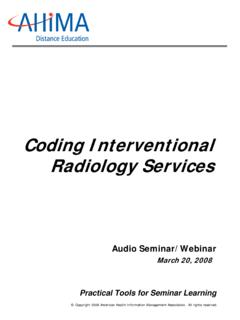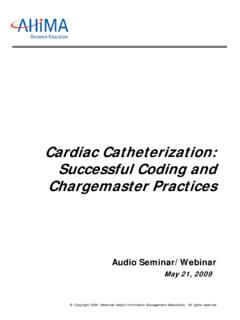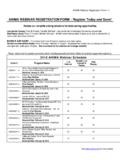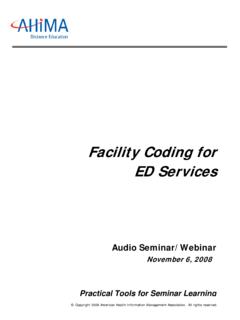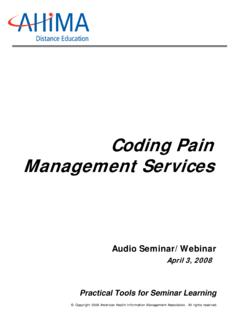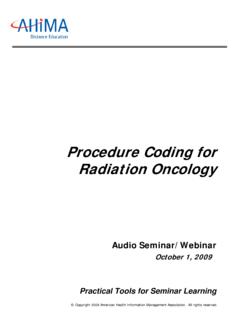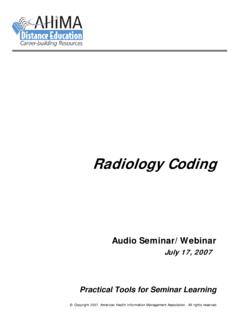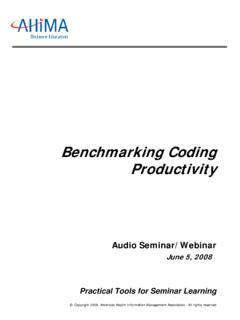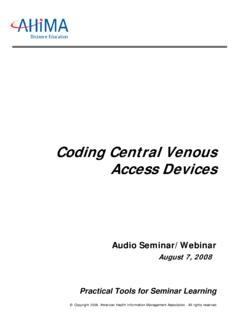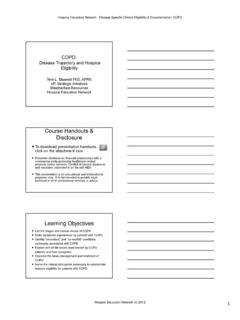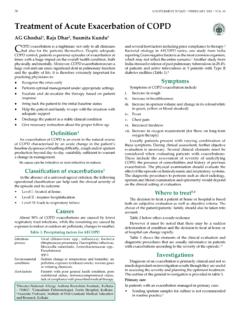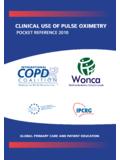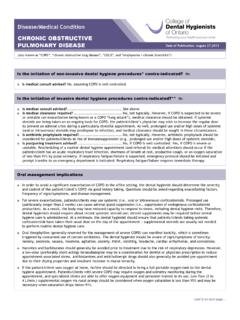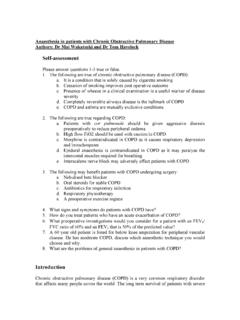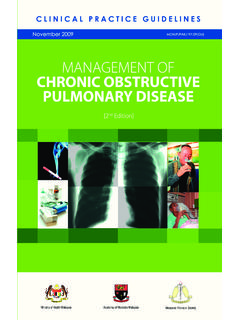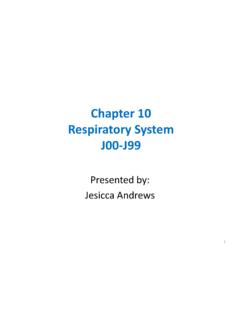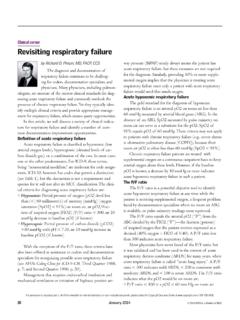Transcription of Coding in the Long Term Acute Care Setting
1 Copyright 2007 American Health Information Management Association. All rights reserved. Coding in the Long Term Acute Care Setting Audio Seminar/Webinar October 18, 2007 Practical Tools for Seminar Learning Disclaimer AHIMA 2007 Audio Seminar Series i The American Health Information Management Association makes no representation or guarantee with respect to the contents herein and specifically disclaims any implied guarantee of suitability for any specific purpose. AHIMA has no liability or responsibility to any person or entity with respect to any loss or damage caused by the use of this audio seminar, including but not limited to any loss of revenue, interruption of service, loss of business, or indirect damages resulting from the use of this program. AHIMA makes no guarantee that the use of this program will prevent differences of opinion or disputes with Medicare or other third party payers as to the amount that will be paid to providers of service.
2 As a provider of continuing education, the American Health Information Management Association (AHIMA) must assure balance, independence, objectivity and scientific rigor in all of its endeavors. AHIMA is solely responsible for control of program objectives and content and the selection of presenters. All speakers and planning committee members are expected to disclose to the audience: (1) any significant financial interest or other relationships with the manufacturer(s) or provider(s) of any commercial product(s) or services(s) discussed in an educational presentation; (2) any significant financial interest or other relationship with any companies providing commercial support for the activity; and (3) if the presentation will include discussion of investigational or unlabeled uses of a product.
3 The intent of this requirement is not to prevent a speaker with commercial affiliations from presenting, but rather to provide the participants with information from which they may make their own judgments. Faculty AHIMA 2007 Audio Seminar Series iiElla James, MS, RHIT, CPHQ Ms. James is director of corporate health information management and the health information security and the privacy officer at Hospital for Special Care in New Britain, Connecticut. The corporation, Center of Special Care, includes a 228-bed long-term Acute hospital, a 280-bed skilled nursing facility, and specialty clinics in the community. Ella is past president of the Connecticut Health Information Management Association and an American Health Information Management Association (AHIMA) Community of Practice (CoP) facilitator for long-term care.
4 She also chairs the Coding committee for the National Association of Long Term Hospitals (NALTH), and is actively involved in Coding audits and education of Coding and documentation practices in the long-term Acute care hospital environment across the nation. Ella is contributing author for two other AHIMA publications, Health Information Management Compliance: Guidelines for Preventing Fraud and Abuse, Forth Edition and Documentation for Medical Records. Ella received her Master of Science degree in healthcare administration at Saint Joseph s College in Maine. Ella has presented programs on the Health Insurance Portability and Accountability Act (HIPAA) at the state, regional, and national levels, and has presented several programs on long-term Acute care Coding for NALTH. Susan M.
5 Marre, RHIA Ms. Marre is director of medical records at New England Sinai Hospital in Stoughton, MA. Susan is currently president-elect of the Massachusetts HIMA and previously served as the director of Advocacy and Legislation and chairperson of the Awards Task Force 2005-2007. She was the lead delegate for Massachusetts 2006. In addition, Susan serves as president of the Silver Lake Boys High School Basketball Boosters. Susan is a Coding consultant for the National Association of Long Term Hospitals (NALTH) and a faculty member for NALTH Coding Boot Camp. She is a frequent lecturer on long-term Acute care Coding and PPS at NALTH meetings. and served as secretary on the NALTH Coding Committee. Table of Contents AHIMA 2007 Audio Seminar Series Disclaimer ..i Faculty ..ii Goals.
6 1 Documentation and Coding 1 CMS 2 Coding and Reporting for LTCH .. 3 copd and 4 Polling Question .. 4 Respiratory 5 Polling Question .. 5 Vent Weaning .. 6 Septicemia, SIRS, Sepsis, Severe Sepsis, and Septic Shock .. 6 Urosepsis .. 7 Pneumonia .. 7 Continued Antibiotics .. 8 CHF .. 8 Combination Code .. 9 Decubital Ulcers ..11 Cellulitis ..11 Hypertension ..12 Hypertension with Heart Disease ..13 Hypertensive Renal Disease ..13 Elevated Blood HIV ..14 Late Fractures ..16 Burns ..16 V Aftercare ..17 Acquired Brain Chronic Kidney Previous Conditions ..19 References ..19 MS-DRG System Severity-Adjusted DRGs ..20 Final CC Criteria ..24 Heart Kidney Bronchitis ..27 Decubitus Ulcers ..28 Heart Disease ..29 Audience Questions Appendix.
7 34 CE Certificate Coding in the LTAC Setting AHIMA 2007 Audio Seminar Series 1 Notes/Comments/QuestionsGoals Review Coding resources that apply to the LTCH Setting Highlight October 1, 2007 changes Give examples of Coding challenges and best practices for Coding professionals1 Documentation and Coding Principles20072 Coding in the LTAC Setting AHIMA 2007 Audio Seminar Series 2 Notes/Comments/QuestionsCoding and Reporting for LTCH The Medicare program defines Long Term Care Hospitals (LTCHs) as hospitals that have a provider agreement with Medicare and have an average Medicare inpatient length of stay of greater than 25 days. Medicare covers LTCHs under the Long Term Care Hospital Prospective Payment System (LTCH PPS) rules with cost reporting periods beginning on or after October 1, CMS Advice Depending on the documentationin the medical record, unresolved Acute conditions and/or the codes for late effects or rehabilitation may be used in the LCTH Setting .
8 National Association of Long Term Hospitals Copyright 2006 by NALTH. All Rights Reserved. No Part of This Document May Be Reproduced In Any Form Without Prior Written Permission From an Officer or General Counsel of NALTH 4 Coding in the LTAC Setting AHIMA 2007 Audio Seminar Series 3 Notes/Comments/QuestionsCoding and Reporting for LTCH LTCHs should be aware that if the patient is being admitted for continuation of treatment of an Acute or chronic condition, guidelines at Section (I)(B)(10) of the Official Coding Guidelines are applicable concerning the selection of principal diagnosis. 5 Documentation and Coding The importance of consistent, complete documentation in the medical record cannot be overemphasized. Without such documentation the application of all Coding guidelines is a difficult, if not impossible, task.
9 The physician is the most important link to accurate, detailed diagnosis Coding assignment. National Association of Long Term Hospitals Copyright 2006 by NALTH. All Rights Reserved. No Part of This Document May Be Reproduced In Any Form Without Prior Written Permission From an Officer or General Counsel of NALTH 6 Coding in the LTAC Setting AHIMA 2007 Audio Seminar Series 4 Notes/Comments/QuestionsCOPD and Asthma The conditions that comprise copd are obstructive chronic bronchitis, subcategory , and emphysema, category 492. X All asthma codes are under category 493, Asthma. Code 496, Chronic airway obstruction, not elsewhere classified, is a nonspecific code that should only be used when the documentation in a medical record does not specify the type of copd being treated. 7 copd Coding Clinic Polling Question:What is the appropriate code assignment for Acute bronchitis and Acute exacerbation of asthma?
10 *1496* * * & Coding in the LTAC Setting AHIMA 2007 Audio Seminar Series 5 Notes/Comments/QuestionsRespiratory Failure Code , Acute respiratory failure, may be assigned as a principal diagnosis when it is the condition established after study to be chiefly responsible for occasioning the admission to the hospital, and the selection is supported by the Alphabetic Index and Tabular List. However, chapter-specific Coding guidelines (obstetrics, poisoning, HIV, newborn) that provide sequencing direction take precedence. Respiratory failure may be listed as a secondary diagnosis if it occurs after Respiratory FailurePolling QuestionA patient with chronic myasthenia gravis goes into Acute exacerbation and develops Acute respiratory failure. The patient is admitted due to the respiratory failure.
